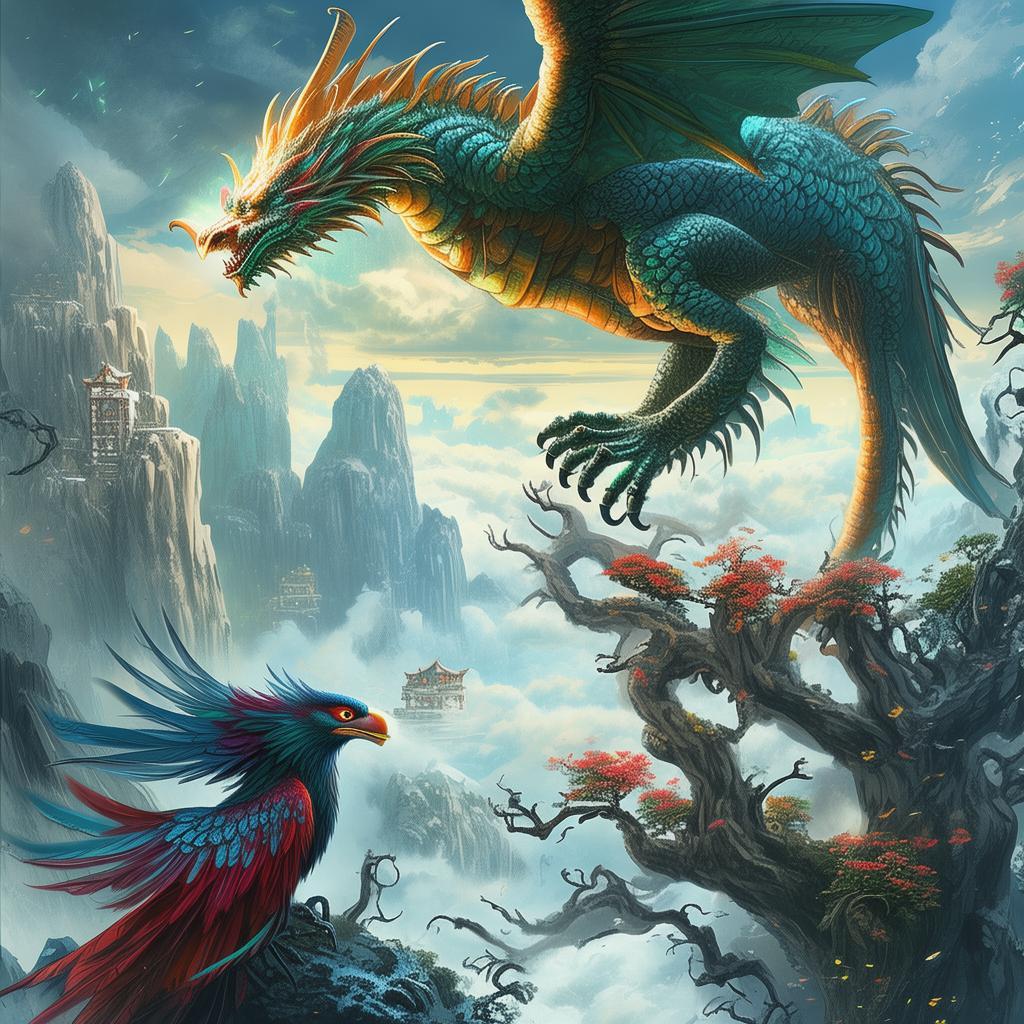The Labyrinth of the Immortal: A Journey Beyond the Known
In the heart of the ancient mountains, where the sky meets the earth, there lay a labyrinth said to be the threshold to the realm of the immortals. This labyrinth, according to the Shanghai Jing, was a place of trials and revelations, where the heart's truest desires could be found and fulfilled. The legend of the labyrinth had drawn many, but none had returned, save for whispers and tales of those who had vanished without a trace.
Amidst the bustling city of Shanghai, a young scholar named Yu Xin, who had heard tales of the labyrinth's allure, found himself in possession of a curious scroll. It was an excerpt from Fu Zhu Lang's Elysium: The Reading of the Shang Hai Jing in the Beyond, detailing the labyrinth's secrets and the trials one must face to reach the heart of the immortals. Yu Xin's life had been devoid of purpose, and the scroll seemed to call out to him, a beacon in the vast sea of the mundane.
The night was dark, and the city was quiet, but Yu Xin's heart was alight with the prospect of a journey beyond the known. He left his home, a simple abode filled with books and dreams, and ventured into the labyrinth, his mind a canvas of anticipation and fear. The labyrinth was not just a physical place; it was a journey through the self, a mirror held up to one's soul.
The first chamber of the labyrinth was a void, a space without light or sound, where Yu Xin found himself adrift. He stumbled upon a voice, an echo of his own, speaking in riddles. "The path you seek is not a straight line," it whispered. "It is the winding path of the heart." Yu Xin realized that the labyrinth was a metaphor for the journey he was on, a quest to understand himself and his place in the world.
As he moved deeper into the labyrinth, the trials became more vivid and perilous. One chamber was a labyrinth of mirrors, where Yu Xin saw countless reflections of himself, each one a different aspect of his character. He was faced with the choices he had made and the decisions that had shaped his life. Some choices brought him to a place of joy, while others led to despair, teaching him the lesson that the past is both a guide and a burden.
In another chamber, Yu Xin encountered creatures from the Shanghai Jing, beings that were part animal, part spirit, and part human. These creatures were a reminder of the fantastical elements that filled the ancient texts, a testament to the vastness of the unknown. He conversed with a nine-tailed fox, who spoke of the nature of change and the fleeting nature of life. The fox's words resonated with Yu Xin, and he realized that the labyrinth was teaching him about the cyclical nature of existence.
The labyrinth's heart was a vast, open space where the walls seemed to recede into infinity. In the center of this space stood an ancient tree, its roots entwined with the earth and its branches stretching towards the heavens. Yu Xin approached the tree, feeling a sense of awe and reverence. He reached out to touch its bark, and a voice filled his mind, "The tree of life bears the fruit of truth. Eat its fruit, and you shall understand the secrets of the universe."

Yu Xin hesitated, for the fruit of the tree was glowing with an otherworldly light. He knew that consuming the fruit would change him, but he also understood that the journey was not about the destination but the journey itself. With a deep breath, he took a bite of the fruit, and a wave of knowledge and insight flooded his being. He saw the patterns of the universe, the interconnectedness of all things, and the fleeting nature of the individual.
In that moment, Yu Xin understood that the labyrinth was not a quest for eternal life but a journey to self-realization. He saw that the path to enlightenment was not about transcending the physical world but about embracing it fully. As he left the labyrinth, his heart was lighter, his mind clearer, and his spirit renewed.
Yu Xin returned to Shanghai, a changed man. He no longer sought immortality but understood the true value of life and the importance of self-discovery. He shared his experiences with others, not as a tale of a mystical journey, but as a reminder of the power of self-reflection and the journey within each of us.
The Labyrinth of the Immortal was not just a story from the Shanghai Jing; it was a mirror held up to the human condition, a testament to the enduring quest for meaning and understanding. And so, Yu Xin's journey became a tale of transformation, one that would echo through the ages, a reminder that the most profound journey one can undertake is the journey within.
✨ Original Statement ✨
All articles published on this website (including but not limited to text, images, videos, and other content) are original or authorized for reposting and are protected by relevant laws. Without the explicit written permission of this website, no individual or organization may copy, modify, repost, or use the content for commercial purposes.
If you need to quote or cooperate, please contact this site for authorization. We reserve the right to pursue legal responsibility for any unauthorized use.
Hereby declared.









